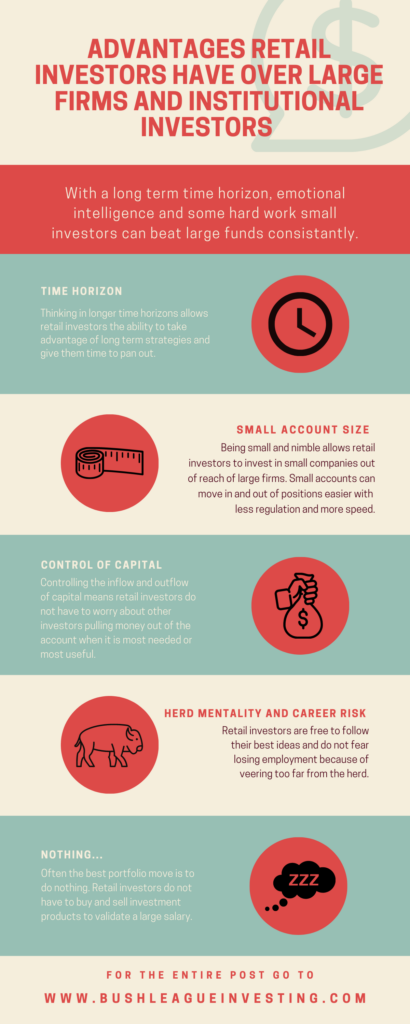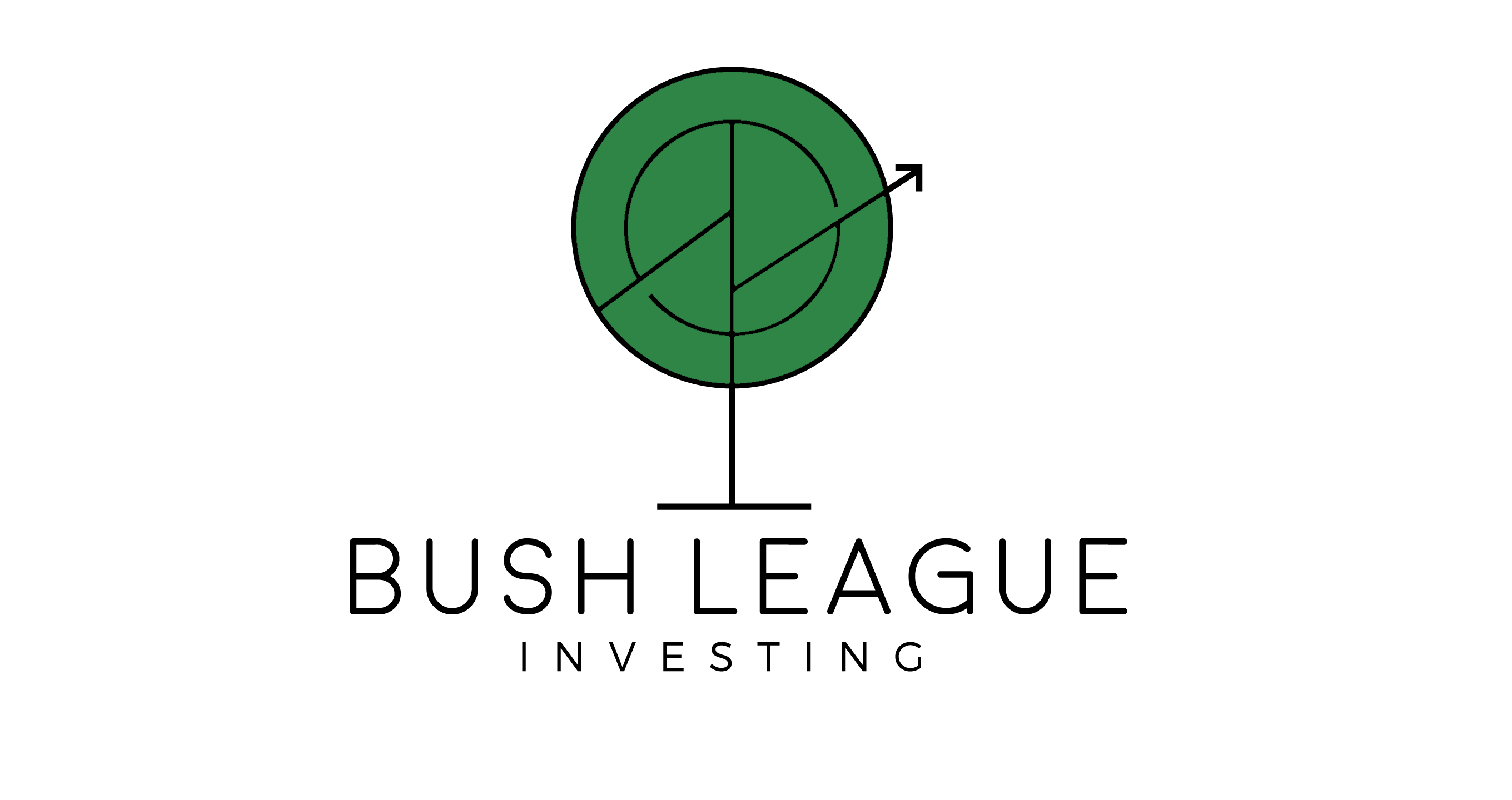Is it worth being a retail investor in an industry seemingly stacked against small players? In the past, high fees, poor access and a lack of good information left retail investors at a large disadvantage. This has all changed in the last 15 years. In the current market environment, we believe retail investors have an overwhelming advantage over larger funds and institutional investors and if you’re willing to work hard, the edge is yours.

Key Advantages
Time Horizon
Investing on your own terms means you decide the timeline to measure if your ideas are working or not. If you are sure your investing thesis is correct, you can let an investment run until it gets proven right or wrong. Imagine being sure that Amazon was going to be a big success in 2003 but only having 1 year to see if you were right or not. This happens yearly as underperforming positions get cut or reduced in managed portfolios only to soar in the next few years. As a smaller scale investor, you have the ability to set up long term strategies and see how they play out without the pressure of yearly, sometimes quarterly, report cards many professional portfolio managers face.
Size of Account
Big money moves to big companies because it has to.
Investors managing large portfolios, say billions of dollars, can’t access the same companies a smaller account can. For example, if we were to assign 5% of a multibillion-dollar portfolio to a company like VCI.V (love this company!) we would own the company outright multiple times over.
As retail investors, there are more options available to us that can make meaningful impacts on our accounts such as companies that are in growth mode or temporarily beaten down to small market caps. Take advantage of this. Warren Buffet has:
1“If I was running $1 million today, or $10 million for that matter, I’d be fully invested. Anyone who says that size does not hurt investment performance is selling. The highest rates of return I’ve ever achieved were in the 1950s. I killed the Dow. You ought to see the numbers. But I was investing peanuts then. It’s a huge structural advantage not to have a lot of money. I think I could make you 50% a year on $1 million. No, I know I could. I guarantee that.”
Small accounts are also much more nimble than large firms. We can be in and out of a position in a few clicks where it can take hours or even days for large firms to execute trades.
Kick Back and Do Nothing….
This sounds foolish but the biggest advantage held by retail investors is the ability to do nothing for long periods of time. If all of our best ideas are already in our accounts and working well, we can leave them alone to work. Professional investors are under much more pressure to do something to validate their large salaries. The optics of earning a six or seven figure salary to make no trades isn’t something most firms endure.
Herd Mentality and Career Risk
As retail investors, if we see an opportunity and have the instinct to act, we can move without a second thought of what others might think. Fund managers have to worry about being seen as too different and risky relative to other funds. When investment decisions are ruled by fear of losing employment for veering too far from the pack, it is easy to see why many funds look similar. There is job security in getting it wrong if everyone else got it wrong too. As retail investors we are free to trade our best ideas, not only the ones that are similar to the herd.
Control over Capital
Large funds are usually made up of multiple investors and are at their mercy in terms of capital. When times are great, investors historically pour into the markets making it hard for managers to find a home for all the capital. When the market dips, investors get scared and if the market really drops, people cut and run. Investors taking out their capital at the bottom forces the large funds to lock in those losses greatly reducing their ability to benefit from the bull run following the correction. Retail investors can add funds when they feel the time is right. This means their capital can be deployed at the times when it can be the most effective and useful. It also means that when things are too extended, they don’t have to force any trades just to meet a predetermined allocation strategy.
Disadvantages
It would be unwise as an investor not to also consider the edges that are working against you.
Research
Large firms have access to a tremendous amount of research and have amazing people, algorithms, and artificial intelligence spending an unfathomable amount of time analyzing it. This is the place retail investors are at the greatest disadvantage. It is impossible to compete in terms of quality and quantity of information and investment of time. While this gap has narrowed, it’s still formidable. If your edge is that you believe you know more than the market, you’re likely wrong.
Are Retail Investors Being Front Run?
There is a lot of speculation and concern that retail investors are being front run in today’s market. Being front run refers to the concept of larger firms having access to your pending trades immediately before they fill so they can trade just prior. This happens in milliseconds and is something you can’t really detect. Limit orders remove this as a concern entirely and with a focus on a long-term time frame, I wouldn’t have cared if I purchased Starbucks at $53.71 a share or $53.73 a share in 2017; especially when it’s currently trading at $106.
Speed and Fills
Without the enormous recourses of large funds, competing on speed is out of the question. The edge that their technology and infrastructure allows is not something that is wise to try and compete with.
Conclusion
Ultimately, if we strategize for the long term, make good decisions and keep our emotions in check our returns will continue to crush those of the S&P 500 and many managed funds.
Many people, including large funds, believe that retail investors are at a disadvantage and are certain to lose. The best way to prove them wrong is know where we have the advantages, where we don’t and use strategies that play to our strengths.
There are many advantages and disadvantages not discussed here. Please let us know your thoughts!
1As quoted in “Wisdom from the Oracle of Omaha” by Amy Stone in Business Week (5 June 1999)
